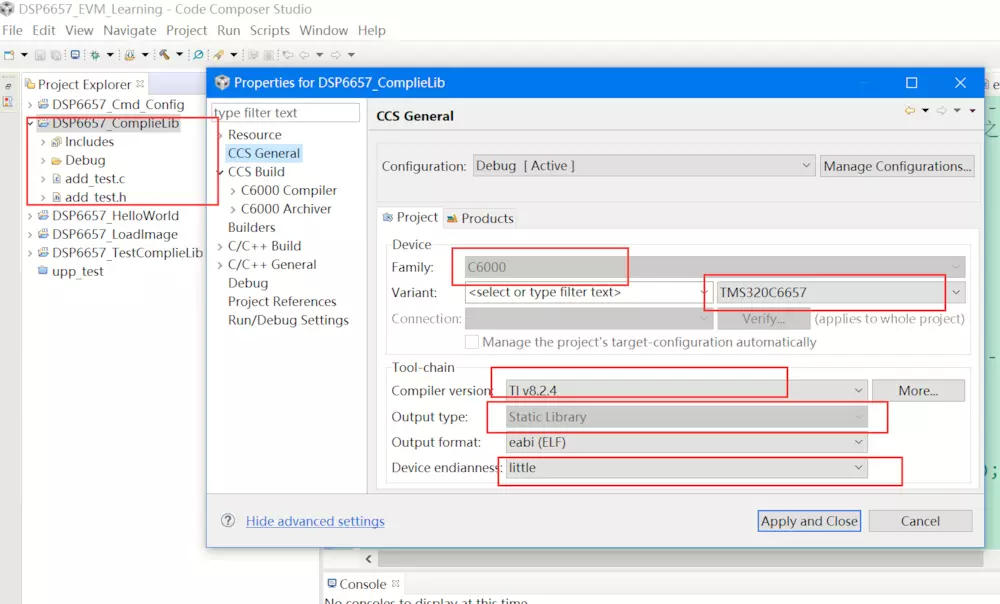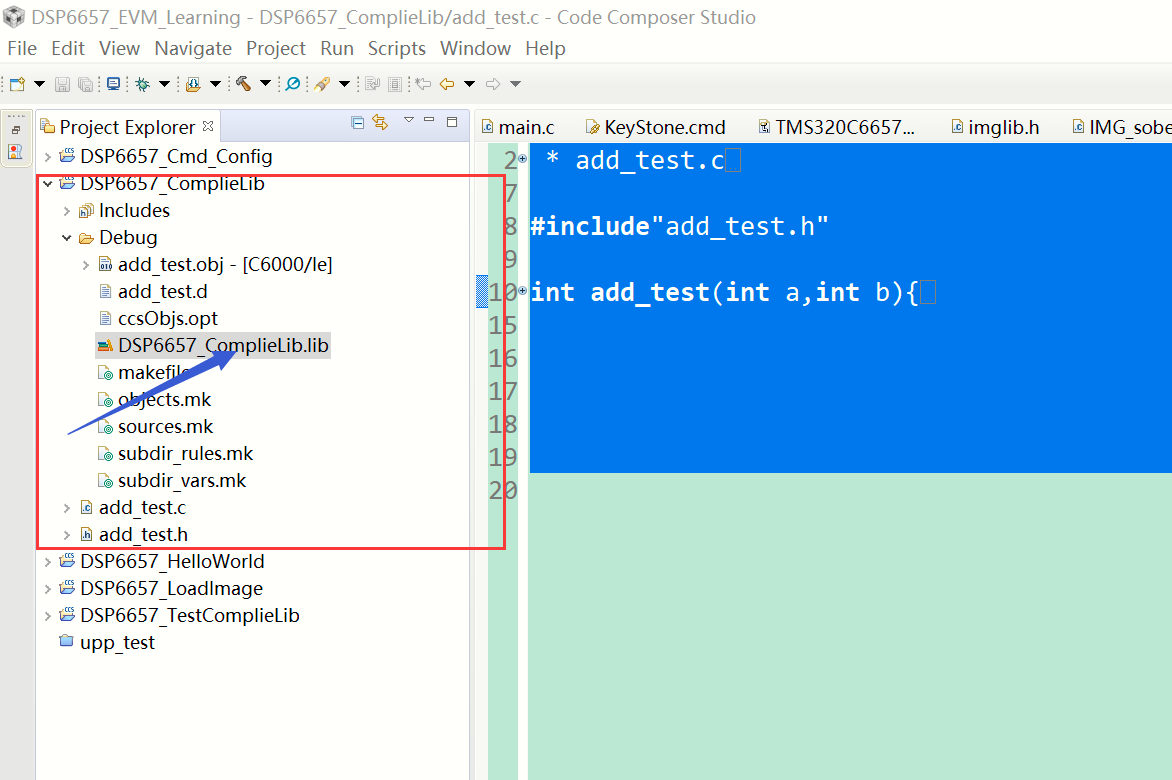|
The OP
Published on 2020-3-1 17:03
Only look at the author
This post is from DSP and ARM Processors
| |||||||||||||||||
|
|
|||||||||||||||||
- 【Posts】TI DSP C6657 Learning - Compiling static library .lib
- 【Posts】dsp6657 serial port learning
- 【Posts】Development of image processing system based on TMS320C6657 dual-core DSP
- 【Posts】Development board based on TI AM5728 (floating point dual DSP C66x + dual ARM Cortex-A15)
- 【Posts】TMS320C6678 chip TI original board development
- 【Posts】TI C2000 series DSP Bootloader CAN online upgrade program and forgotten CSM password decryption technology
- 【Posts】TI DSP CAN online program upgrade question
- 【Posts】Porting OpenCV to TI C6000 DSP
- 【Download】12-layer PCB file of DSP chip C6657
- 【Download】C6657 evaluation board circuit diagram
- 【Download】Open source compiler for TI\'s C54X DSP series under Linux platform
- 【Download】TI C6678 8-core DSP boot loading, EVM debugged OK
- 【Download】CSL template library function description for TI DSP TMS320C6713
- 【Download】TI C2000DSP Engineer Training
- 【Download】Chapter 6_TI_TMS320C2000 Series DSP_Typical Peripherals
- 【Download】TI DSP tms320c6416 EDMA test code
- 【Articles】Reference Solution of 1.25GHz DSP Based on TMS320C6657
- 【Articles】Texas Instruments TMS320C66x multicore DSPs help industrial automation developers achieve unprecedented performance, scalability and flexibility
- 【Articles】Fingerprint recognition block diagram and solution using TI's low-power C5x DSP
- 【Articles】TI's solution based on low-power TMS320C5515 DSP
- 【Articles】I2C module configuration and application of TI series DSP
-
TI DSP C6657 Learning - Compiling static library .lib
FriendswhoarefamiliarwithC++developmentknowthatweusuallyneedtointroducemanythird-partycompiledlibrariesintoourcode,someofwhicharestaticlinklibrariesandsomearedynamiclinklibrariesmethodinterfaces,whichcaneffectivelyprotectthesourcecodefrombe ...
-
I want to compile the STM32 library into .lib, and then link the application code. The compilation is successful, but it cannot be run.
AstitleIwanttocompiletheSTM32libraryintoThecompilationissuccessful,butitcannotberun.Ihavetriedsingle-stepdebugging,anditispossibletoturntheLEDonandoff,butitdoesnotworkwhenrunning.Letmestartfromthebeginningsothatit'snotunclear.ImeanFirmwareH ...
-
[Review of "Artificial Intelligence Practical Tutorial"] Python Function
#【《ArtificialIntelligencePracticeTutorial》Evaluation】PythonFunction##FunctionIfablockofcodeisneededmultipletimeswhendevelopingaprogram,butinordertoimprovetheefficiencyofwritingandthereuseofcode,thecodeblockswithindependentfunctionsareor ...
- Help! My newly bought power bank is broken!
- I have a question about the network port circuit?
- 485 sends data but receives data intermittently
- [ESP32-Audio-Kit Audio Development Board Review] 5. Summary and Outlook
- Master's thesis - Stability analysis of time-delay systems
- SinlinxA33 development board Linux kernel workqueue (with actual test code)
- Application of Programmable Controller in the Reconstruction of Electrical Control System
EEWorld Datasheet Technical Support
-
"Cross-chip" quantum entanglement helps build more powerful quantum computing capabilities
IBM scientists have achieved "cross-chip" quantum entanglement - successfully entangled two "Eagl
-
Ultrasound patch can continuously and noninvasively monitor blood pressure
A research team at the University of California, San Diego, has developed an innovative wearable
-
Europe's three largest chip giants re-examine their supply chains
At the Electronica 2024 CEO Roundtable held just last week, the CEOs of three chip giants, Infine
- It is reported that Kioxia will be approved for listing as early as tomorrow, and its market value is expected to reach 750 billion yen
- The US government finalizes a $1.5 billion CHIPS Act subsidy to GlobalFoundries to support the latter's expansion of production capacity in the US
- SK Hynix announces mass production of the world's highest 321-layer 1Tb TLC 4D NAND flash memory, plans to ship it in the first half of 2025
- UWB is a new way to use it in cars. Can wireless BMS also use it?
- Filling the domestic gap! China Mobile, Huawei and others jointly released the first GSE DPU chip
- Samsung Electronics NRD-K Semiconductor R&D Complex to import ASML High NA EUV lithography equipment
- Apple reveals the secret of its own chip success: competitors can't use the latest cutting-edge technology
- Problems with STM32 and passive buzzer playing sound
- Embedded Tutorial_DSP Technology_DSP Experiment Box Operation Tutorial: 2-28 Building a Lightweight WEB Server Experiment
- OPA847IDBVR op amp domestic replacement
- AG32VF407 Test UART
- [Digi-Key Follow Me Issue 2] Chapter 1: Sharing on receiving the goods
- What model is this infrared receiver? Which model can be used instead? Thank you
- Selling brand new unopened ZYNQ 7Z020 FPGA core board
- The LORA module used in the lithium battery-powered water meter setting can save energy when 100 water meters are installed in one corridor.
- I would like to ask, when a port is set to RX0, is it necessary to set the input and output direction of this port?
- Why is this year so difficult? It’s even more difficult than during the pandemic. I’m 30 and facing unemployment. I’m so confused.
- Ask about the voltage regulator test question
- [Xiaohua HC32F448 Review] About Xiaohua Semiconductor's UART interrupt sending and PRINTF construction and redirection
- 【BIGTREETECH PI development board】 HDMI output test
- 【BIGTREETECH PI development board】+08. Audio test (zmj)
- [Xiaohua HC32F448 Review] +RTC electronic clock
- 有奖直播报名| 高可靠性IGBT新选择 —— 安世半导体650V IGBT
- 【直播时间】12月19日(周四)下午15:00-16:30
【直播好礼】定制双肩商务包、30元京东卡、吸管玻璃杯
- 安世半导体直播报名中
- 直播主题:安世半导体理想二极管与负载开关,保障物联网应用的稳健高效运行
直播时间:12月17日(周二)下午14:00
报名就有机会获得:定制双肩商务包、30元京东卡、吸管玻璃杯
- PI 电源小课堂 | 无 DC-DC 变换实现多路高精度输出反激电源
- 时间:即日起-12月15日
看视频学习电源干货,答题赢取京东卡!
- 参会有好礼 | 2024 瑞萨电子MCU/MPU工业技术研讨会
- 深圳站:11月30日(周六)深圳湾万怡酒店
上海站:12月06日(周五)上海喜玛拉雅酒店
奖励设置:现金红包、螺丝刀套装或30元京东卡
- Littelfuse 新品赋能电子产品安全可靠并高效, 10+挑战等你探索!
- Littelfuse 应用赋能星球,覆盖了诸多应用痛点及解决办法,邀请工程师一起探索,解锁更多设计力!
- 下载资料赢好礼!看Vicor模块化电源解决方案如何推动创新
- 活动时间:即日起-2024年12月31日
如何参与:点击活动页内您想了解的模块,找到资料下载即可参与抽奖,活动结束后统一发奖!
- 有奖活动|英飞凌高密度双相电源模块为高性能运算平台而生
- 活动时间:即日起-12月15日
活动奖励:蓝牙音箱、氮化镓充电器套装、黑色小背包
- 本周精选下载推荐:电源管理基础Dummies
- 本周小编给大家带来一本超简单、超干货的电子书——《电源管理基础Dummies》!内容深入浅出,排版舒服简洁,分分钟能get到电源管理最核心的知识内容。
EEWorld
subscription
account

EEWorld
service
account

Automotive
development
circle

About Us Customer Service Contact Information Datasheet Sitemap LatestNews
- I want to get started with machine learning from scratch, what should I do?
- I want to get started with deep learning from scratch, what should I do?
- For a quick introduction to the basics of FPGA hardware, please give a learning outline
- For the introduction to smt maintenance, please give a learning outline
- Please give a learning outline for the introduction of various machine learning algorithms
- For graduate students, please give a study outline for deep learning
- How much FPGA learning is considered to be entry-level
- How long does it take to get started with microcontroller learning?
- What to watch for beginners in machine learning
- What does edge computing mean in the NVR space?


 Room 1530, Zhongguancun MOOC Times Building,
Block B, 18 Zhongguancun Street, Haidian District,
Beijing 100190, China
Tel:(010)82350740
Postcode:100190
Room 1530, Zhongguancun MOOC Times Building,
Block B, 18 Zhongguancun Street, Haidian District,
Beijing 100190, China
Tel:(010)82350740
Postcode:100190
 京公网安备 11010802033920号
京公网安备 11010802033920号






 提升卡
提升卡 变色卡
变色卡 千斤顶
千斤顶